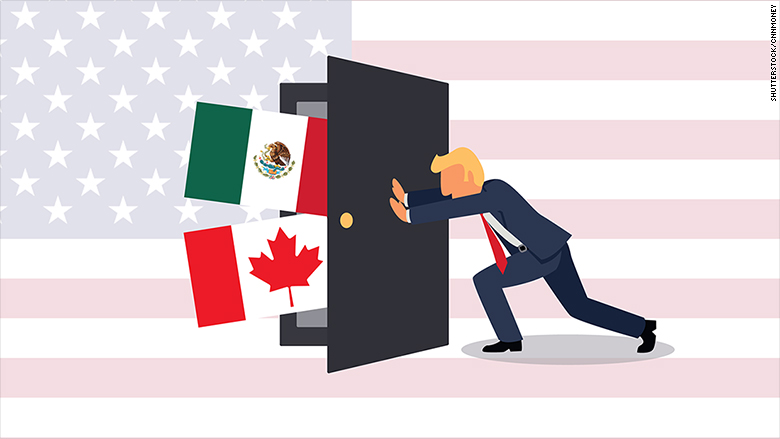
Chances that the North American Free Trade Agreement will end are growing. What does Mexico have to do in the event President Trump finalizes the divorce that he has been proposing since his campaign?
NAFTA renegotiation has gone on for a couple of months, and as time has passed, the United States is offering proposals that are unacceptable to Mexico. It is clear, which should not come as a surprise, that Trump and his team are mostly interested in a trade protection model. They want, for example, Mexico to only export agricultural products on a seasonal basis when U.S. producers, limited by climate, are not harvesting fresh vegetables.They want to increase the amount of U.S. goods exported by Mexico back to the U.S., including the ever-important number of automobiles. They want to dismantle the system of trilateral dispute resolution, replacing it with a system litigated in U.S. courts. Above all, they want to reduce the trade deficit the U.S. has with Mexico — a flawed goal that only masks their intention of reversing more than two decades of free trade.
The U.S. wants all of this, which is, in principle, unacceptable for Mexico. If they were to make an attractive proposal in return, an actual discussion might take place. The problem is that, much like Trump, the United States wants everything in exchange for … nothing. This is not how negotiations happen, and in fact, we cannot even think of this as a negotiation. What Trump wants is an imposition. If this continues, at some point the process will come to a screeching halt, and the president of the United States must decide if he will invoke Article 2205 to remove his country from NAFTA.
If he so chooses, a long, drawn-out legal process in the U.S. will follow to determine if the executive branch has the authority to abolish a legislative act such as the treaty. The issue will undoubtedly end up in the United States Supreme Court. Meanwhile, there will be uncertainty negatively affecting foreign investment in Mexico and, in turn, economic growth.
Across the globe, we are seeing a wave of nationalism. Countries want to scale back the growth of globalization. The United Kingdom intends to depart from the European Union, Catalonia from Spain, and Trump from Mexico. In a democracy, voters rule. Or more precisely, a minority of the electorate actually participating in elections winds up ruling. The question is what Mexicans will do if we indeed annul the trade pact with our neighbor to the north (and add immigration to the list)
I believe that, in the face of the nationalist wave, we must continue on the broad-minded path. I think this because Mexico has more to win in economic, political and social terms. If we close our doors to the enormous U.S. market, we need to look for new markets. We have to take advantage of openness and competitiveness developed over the years in order to export to other countries. It is a matter of logistics. If China can do it, so can we.
But I am aware that, when faced with the separation Trump wants, a nationalistic fervor will emerge here as well — against a more global outlook. There is no shortage of people who wrap themselves in the flag and try to close off their country to the world, especially its economy. Voices claiming to “defend” the domestic industry and “strengthen” the local market will crop up, clamoring for the state to impose tariffs and quotas preventing the arrival of products from other countries, and calling for the government to subsidize businesses in order to protect and create employment within the country. The problem is that we have already lived through this model and we know what inevitably happens: collusion between public officials benefiting directly and supposed businessmen, who, in reality, are friends living off the state.
The new political division of democracies, between nationalists and globalists, as The Economist put it, will also reach Mexico. Thanks to Trump, we will have to debate how open or closed to the rest of the world Mexico should be. Do we want to remain a country of imports and exports welcoming foreign trade with wide open arms and providing certainty to private foreign investment? Or are we going to a model in which the state protects businesses and domestic labor? I prefer an open Mexico. We need to hone our arguments in order to win the debate over those wishing to isolate themselves from the world in the footsteps of other countries afraid of globalization.

Leave a Reply
You must be logged in to post a comment.